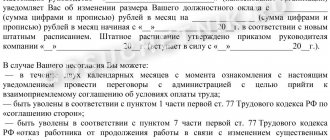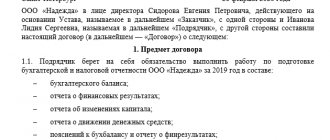Changing the conditions included in the signed text of the employment contract, its voluntary conclusion and termination is a guaranteed right of the employee. No one may be unlawfully hired against his or her will, dismissed without the knowledge of the employee, and remain within the strict framework of the contract throughout its duration.
Unilateral action regarding labor relations is not permitted without the consent or at least prior notification of the other party, with rare legal exceptions. Such deviations from the rule and exceptions are made for the employer in order to make the most efficient use of capacity in the cases specified by law.
Is it possible to change the terms of an employment contract?
Changes to the essential terms of the employment contract (Labor Code of the Russian Federation, Article 72) are carried out upon the conclusion of an additional agreement between the employer and the employee, which becomes an integral part of the working agreement.
Both the employer and the employee have the right to initiate them. Changes to the terms of the employment contract determined by the parties are allowed when they do not infringe on the rights and do not reduce the level of guarantees to employees in comparison with those established by labor legislation.
Changes in the essential terms of the employment contract occur:
- at the will of the employee;
- at the will of the employer;
- for reasons that do not depend on the wishes of the parties.
Chapter 12 of the Labor Code of the Russian Federation defines a list of circumstances under which an existing employment contract can be edited:
- transfer to another unit with the consent of the employee;
- changes to the contract due to changing working conditions;
- new owner of the enterprise;
- removal of a person from performance of official duties.
CONCERNING CHANGES IN LABOR RELATIONS WHEN CHANGING THE OWNER OF PROPERTY OR REORGANIZING THE ORGANIZATION
1. The founder of a legal entity can be a party to an employment contract only for the head of the organization, but not for its other employees.
2. In the event of reorganization, as well as a change in jurisdiction (subordination) or type of institution, labor relations with employees continue; there are no grounds for dismissing employees and their subsequent hiring, including through transfer, therefore such actions are illegal.
3. It is not necessary to obtain the consent of employees to continue working, but they have the right to refuse. The refusal must be in writing. The dismissal of such employees is the prerogative of the “new” organization.
4. It is necessary to notify employees about the upcoming reorganization and their right to refuse to continue working so that they have the opportunity to make an informed decision about continuing to work, even if the reorganization does not entail a change in any terms of the employment contract.
5. After the reorganization, the new staffing table comes into force. It can be approved in advance, before the reorganization.
6. The staffing schedule of the reorganized organization ceases to be valid with the termination of its activities according to the entry in the Unified State Register of Legal Entities.
Changing the terms of the employment contract at the initiative of the employee
An employee may consider that the agreement concluded with him requires changes. In this case, he has the right to contact the employer with a corresponding request.
The way to contact the employer is to send a statement to him, which sets out the reasons for making changes to the employment agreement, their nature, and the possible timing of their introduction. The document is drawn up in writing and registered.
After studying the application, the manager can:
- agree to changes in the contract;
- refuse the employee.
The employer expresses the decision in writing (with a resolution on the application or a response letter).
The manager has the right to support the employee’s proposal for changes, but is not obligated to do so. If refused, the person continues to work under the same conditions.
Important points when changing your profession name
This procedure is carried out when new characteristics are included in the Unified Tariff and Qualification List. Or when the names from the directory of employee positions change. That is, the old designations are replaced by new ones.
Such situations require transfers to another job if the changes concern not only titles, but also:
- volume of skills;
- knowledge;
- employee functions;
- duties or rights.
Such procedures are in any case carried out with consent, without exception. Renaming of professions and positions is carried out either by the Government or another body vested with the appropriate powers. The manager has no right to be guided by other information or his own wishes.
As for the renaming of specialties, the law does not consider such situations to be a significant change in conditions. After all, the specialties themselves are defined within certain professions. Therefore, the rules provided specifically for them apply.
Additional agreement
If the employer agrees with the employee’s proposed change option, the parties must draw up and sign an additional agreement to the employment contract in two copies. This paper records the existing agreements. It should reflect the details of the parties, the number and place of execution, clearly state the provisions that have been changed, and indicate the date from which the agreement will begin.
Essential and “non-essential” conditions
The significant ones include the following:
- Place of work. It is clearly indicated where exactly the work function is performed. This is important because the absence of an employee for four or more hours at a specified place is regarded as absenteeism and is a reason for possible dismissal.
- Labor function. It describes in detail what the employee will do. The most complete regulation of types of activity is given by the job description. The employee gets acquainted with it under his personal signature. An employer cannot require an employee to perform any unspecified functions. A change in a job description previously signed by a person being hired is considered a change in the job function and requires obtaining the consent of the employee governing it.
- Work period. The date from which the newly hired employee begins work is indicated. Until this moment, he is not considered an employee and the company’s policy does not apply to him. Salary and length of service are calculated from the specified day. Most often, the working day following the day the contract is signed is considered the first day of work, but this is not necessary. Fixed-term contracts have an expiration date. Perpetual ones do not.
- Terms of remuneration. If an agreement on this issue is not reached or it is not reflected in the written version of the contract, then it is not considered concluded, and the parties are not considered to be bound by an employment relationship.
In practice, all written conditions included in the text of the contract are considered essential. Strictly speaking, it is not permissible to change the employment contract in any part or clause. Any changes are formalized in a written document - an additional agreement. It contains the same details as the main contract. Changes that are not properly completed are invalid.
“Non-essential” conditions may include information about benefits, bonuses and other types of employee incentives. It is convenient for the employer to formalize each incentive with a separate order with the motivation for applying the incentive. Then it is in the nature of the employer’s right, and not his obligation. The decision to reward for a certain period of work is made by the employer without taking into account the opinion of the employee being rewarded.
The issue of improving the social and living conditions of workers is similarly considered if the employer has a social policy at the enterprise.
The position regarding the employee’s obligation to work for some time for the employer is somewhat controversial if the employer paid for the employee’s training or organized it on his own. The courts recognize the right of the employee to offer the employer to pay part of the expenses and terminate the employment contract with him.
In principle, all conditions specified in the contract are considered essential in practice. Therefore, in order to avoid protracted proceedings with administrative and judicial authorities protecting workers, it is necessary to adhere to a strict algorithm when implementing a decision to change its conditions.
Notification
If the employer needs to change the terms of the contract, he sends a proposal to the employee at least two months in advance explaining the reasons for the need to adjust previously reached agreements.
The employer must issue an order regarding the changes introduced at the end of the notice period, indicating their reasons. The document must indicate the deadline for the employee to make a final decision. Employees should be familiarized with the administrative document in writing.
It is unacceptable to put pressure on an employee, so if he refuses, the requirements remain the same.
The employer has the right (Article 72.2 of the Labor Code of the Russian Federation) to change the conditions unilaterally if:
- any natural disasters;
- industrial accidents, accidents;
- fires, floods, ice, etc.
It is permissible to change the provisions of the contract by way of a unilateral decision made by the employer when organizational or technical conditions of work change (Article 74 of the Labor Code of the Russian Federation).
The salary reduction must be caused by organizational or technological reasons
Unlike staff reduction (when the employer is not required to prove the expediency of abolishing a particular unit), changing the terms of the employment contract must be justified by specific reasons. In the event of a legal dispute, it is the employer who will have to prove that he did not have the opportunity to maintain the working conditions as they were (clause 21 of the Resolution of the Plenum of the Supreme Court of the Russian Federation dated March 17, 2004 N 2).
The law specifies only two reasons for changing the terms of an employment contract at the initiative of the employer: organizational or technological changes.
The following may be recognized as organizational:
- changes in the company's management structure;
- internal restructuring of the enterprise with redistribution of the load among departments or specific positions and, as a result, replacement of the remuneration system.
Technological changes may include:
- introduction of new production technologies, machines, units, mechanisms;
- improvement of workplaces;
- development of new types of products, etc.
Thus, the company cannot justify changing the terms of the employment contract on reasons such as financial difficulties, since this would be contrary to the Labor Code of the Russian Federation. It should also be remembered that the introduced changes should not worsen the employee’s position in comparison with the terms of the collective agreement (Part 8 of Article 74 of the Labor Code of the Russian Federation). For example, if a collective agreement establishes the minimum level of wages for employees of an enterprise, then the salary under new working conditions cannot be less than that established by the collective agreement.
It is important for the employer to prove that it is precisely because of the changes being introduced that the terms of the employment contract should be revised. The absence of adequate evidence of the validity of the changes will indicate that changes to employment contracts and subsequent dismissal due to disagreement with changes in working conditions at the initiative of management are illegal. Whereas the presence of such evidence will confirm the company is right.
The employee refused changes to the contract, but agreed with the transfer
If you refuse to work under the new conditions and have consent to the transfer, the parties draw up an additional agreement providing for transfer to another position (from the list proposed by the employer).
The employer creates an administrative document on the transfer in accordance with Art. 72.1 of the Labor Code of the Russian Federation and enters information into the personal card T-2 (Resolution of the State Statistics Committee No. 1 of 01/05/2004).
Transfers and relocations, temporary and permanent
The manager can move employees to other departments only with written consent, and nothing else. An exception is situations where, after such an event, duties are performed in the same area. Consent is not required in the case when the unit is changed for operation, but the functions themselves remain the same.
The main requirement is that wages should not be reduced, even when it comes to a temporary transfer. If the new working conditions have medical contraindications, then such a procedure is prohibited.
The employee refused both the change in the terms of the contract and the transfer
In such a situation or in the absence of vacancies in the institution at the end of the notice period, the employment agreement is terminated on the grounds provided for in clause 7, part 1, art. 77 Labor Code of the Russian Federation.
To carry out the procedure correctly you need:
- receive an employee’s refusal (in writing) to work under new conditions;
- register it;
- offer another job;
- get rejected;
- draw up and register a notice of termination of the employment agreement;
- issue and register a dismissal order;
- familiarize the employee with it in writing;
- draw up and issue a work book;
- make due payments.
Regarding suspensions from work
The following situations give the right to exclude an employee from even direct duties:
- When authorized government bodies make a requirement.
- Inability to work due to medical conditions.
- Working conditions require medical examinations, but the citizen did not undergo the procedure.
- Refusal to undergo safety training.
- Appearing at work while intoxicated.
Job offer
If an employee refuses to work in other conditions, the employer must offer in writing the vacant positions available in the area in accordance with qualifications. In the absence of such, the employer offers another lower-level position or work that is paid lower, and the employee is able to perform it, taking into account his state of health.
Complying with the requirements of Art. 74 of the Labor Code of the Russian Federation, the employee should be offered a list of vacancies with a name, description of responsibilities, working conditions (salary, regime). Vacancies must be offered throughout the notice period. When offering such positions, the manager does not have the right to check the business and other qualities of the employee, since the work must initially correspond to the person’s qualifications. The employer is obliged to offer positions from another locality when this is provided for in the collective agreement or labor agreement.
Job center notification
In connection with innovations in the institution associated with innovations in labor technologies, there may be a threat of mass layoffs. In this case, the employer has the right to introduce a part-time work regime (Article 74 of the Labor Code of the Russian Federation). If there is a trade union, such actions must be coordinated with it. The criterion for mass dismissal is established by an industry agreement, and in its absence, Resolution of the Council of Ministers of the Russian Federation No. 99 dated 02/05/1993 helps to determine it. The maximum period for which the regime can be established is 6 months.
The employer is obliged to send information to the employment service about the introduction of such a regime no later than 3 working days after the decision is made. If the layoff affects only one employee, the employer notifies the employment authorities 2 months in advance. If the dismissal is widespread, the service should be informed 3 months in advance.
By Order of Rosstat dated August 6, 2018 No. 485, a new form P-4 was approved, the use of which will begin in the first quarter of 2021.
Additional agreement or dismissal order
If the employee does not agree to work under the new conditions, the employer must issue an order using the unified T-8 form. The basis for the document will be the employee’s refusal to continue working in the new conditions.
The administrative document is drawn up with reference to clause 7, part 1, art. 77 of the Labor Code of the Russian Federation, indicating the full name, last day of work and signed by the manager. The employee is familiarized with the order to terminate the employment agreement against his signature. If it is not possible to bring the contents of the paper to the attention of the employee or he refuses to sign the order, an appropriate entry must be made in it.
About specific situations
It is impossible to apply disciplinary sanctions only for the refusal of employees to continue cooperation in changed conditions. This is a right enshrined in law.
In practice, managers often force work to continue after conditions have changed and the month's notice period has expired. If employees do not agree, they are fired immediately. Absenteeism and systematic violations of disciplinary procedures are recorded as grounds.
In such circumstances, the court agrees to change the wording of the dismissal. The case is considered on the basis of the facts that actually occurred.






